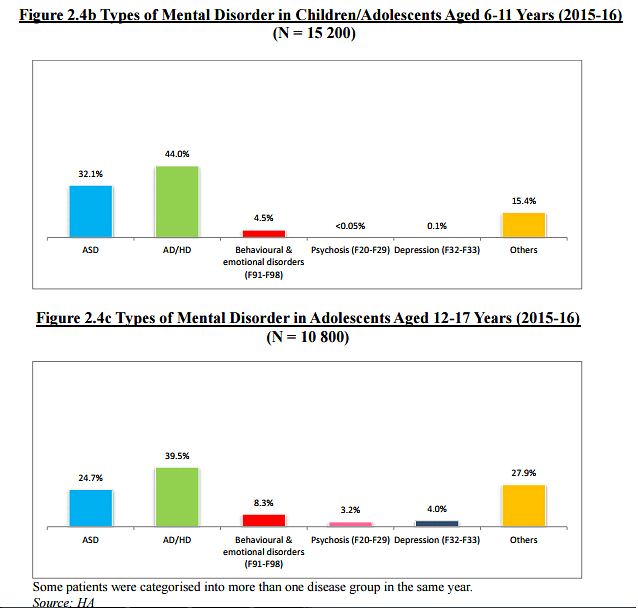Mental illness cases involving children and teenagers that were addressed by Hong Kong's Health Authority (HA) have risen by more than 50 per cent in the last five years, Hong Kong's Review Committee on Mental Health said in a report released this week.
The caseload of the child and adolescent psychiatric teams of the HA rose from 18,900 in 2011-12 to 28,800 in 2015-16, the committee said in the 247-page report, which made 40 recommendations on 20 areas for Hong Kong's mental health situation.
The major disorders present in these children were Autism Spectrum Disorders (ASD) and AD/HD or attention-deficit/hyperactivity disorder, which made up more than half of the caseload.
Of those in Hong Kong who had disabling mental illnesses in mid-2016, 16 per cent were below 20 years of age, according to the report released on Tuesday (April 18).
Of this 16 per cent, half were aged 10 to 19 while the other two quarters were five to nine years old and newborns to four years old respectively.
The report, released by Hong Kong's Food and Health Bureau, cited a 2003 World Health Organisation (WHO) report that stated that up to 20 per cent of children and adolescents worldwide suffer from disabling mental illnesses.

According to WHO's website, half of all mental illnesses begin by the age of 14 and three-quarters by the mid-20s.
The committee's Expert Group on Child and Adolescent Mental Health Services recommended a three-tier model for the delivery of mental services for children and adolescents.
The bottom tier includes prevention, early detection, intervention and mental health maintenance through public education, parenting programmes, and promotional activities in the community or at schools.
Tier two provides targeted intervention for red-flagged cases, and provides management of stabilised cases in the community. The top tier offers intervention by specialists for those with moderate to severe mental health cases.
The Hospital Authority's mental health budget has increased from about HK$3.4 billion (S$611 million) in 2011-12 to about $4.7 billion in 2016-17, and manpower for psychiatric services has also increased by about 15 per cent in the past five years, review committee chairman Dr Ko Wing Man said.
The report noted: "Children are our future. The recommendations in this report reinforce the Expert Group's belief that supporting children and adolescents with mental health problems is the joint responsibility of parents, teachers, healthcare and social care professionals, as well as other caring players in the community."
It called for "concerted efforts of the community" to help flag, treat and limit mental illnesses.
In Singapore, there has been a reported rise in the young seeking help for mental issues. The Samaritans of Singapore said in a November report last year that the number of teens calling its suicide hotline for help with mental health doubled from 2014 to 2016.


